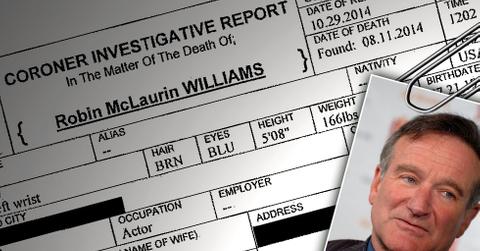Robin Williams’ Secret Pain: Actor Had Early Signs Of Dementia At Death, New Autopsy Report Reveals

Nov. 7 2014, Published 5:07 p.m. ET
Depression, anxiety, and Parkinsons’s disease weren’t the only issues plaguing Robin Williams in the months before his death. According to a new autopsy and toxicology report obtained by RadarOnline.com, his brain also showed signs of dementia.
“Neuropathy findings in this case support the diagnosis of diffuse Lewy body dementia,” the report reads, “…as established by the National Institute on Aging/Alzheimer’s Disease.” The disease is the second-most-common degenerative brain disease after Alzheimer’s.
Though Williams was not aware of the diagnosis at the time of his death, according to the new report, he was having a "hard time sleeping and was restless due to his Parkinson’s and anxiety issues, which is why he was sleeping in a separate bedroom” from his wife, Susan.
He was "Last seen alive by his spouse, Susan Williams at about 2230 hours the previous evening …” the report reads, and "had reportedly been sleeping in his step-son’s room, as the step-son was away with his father."
Susan "left the house around 1030 hours this morning to run errands … and became concerned when the subject had not come out of his room” so she slipped a note “under the bedroom door, asking the subject if he was ok,” according to the report.
Susan and a friend were able to pop the lock with a paperclip, at which time Williams was found "unresponsive on the floor … No rescue efforts were attempted, as obvious signs of postmortem changes were present, including lividity and rigor."
Williams was “in a seated position, facing west, leaning forward with a black nylon belt secured around his neck. The tongue slightly protruded forward and the lip was darkened. His right shoulder was in contact with the closet door, several inches below the doorknob…His thighs were extended in front of his torso with both hands resting over the center of his thighs.”
"The opposite end of the belt around his neck was secured between the vertical side of the closed closet door and doorframe, positioned along the doorknob side of the door,” the report reads. "A folded white towel was looped over the belt, separating the belt from the skin … possibly used the towel in order to avoid pain."
Investigators found bottles of anti-depressants seroquel and mirtazapine, as well as a pocket knife covered with some dried blood, and a ginger ale.
A search of the beloved actor's iPhone revealed “nothing to suggest suicidal ideation or that any messages of suicidal intent had been sent to anyone.” There were "multiple alarm reminders were on the calendar, all set to remind the subject when to take medication.”
His iPad had "several tabs open to websites discussing medications, including lyrica and propranolol,” but there was "nothing on the contents of the iPad consistent with suicidal ideation,” the report says.
"The subject reportedly suffered sporadically from depression for most of his adult life,” according to the report. "He had a prior history of alcohol and drug abuse, but had reportedly been sober for several years. He also struggled with anxiety and paranoia in the past, but more so over the last year. Despite his long history of depression, he had no known history of suicidal ideation or behavior. In addition to his recent uptick in depression, he was recently diagnosed with early Parkinson’s disease. … He didn’t mention anything about suicide following his Parkinson’s diagnosis."

Investigators found that he had been prescribed a variety of drugs, including lansoprazole, rapaflo, finasteride, amoxicillin, quetiapine, carbidopa, and mirtazapine.
Toxicology reports showed he had mirtazapine, desmethylmirtazapine, caffeine, and theobromine in his blood at the time of his death, but no alcohol.
Story developing.


